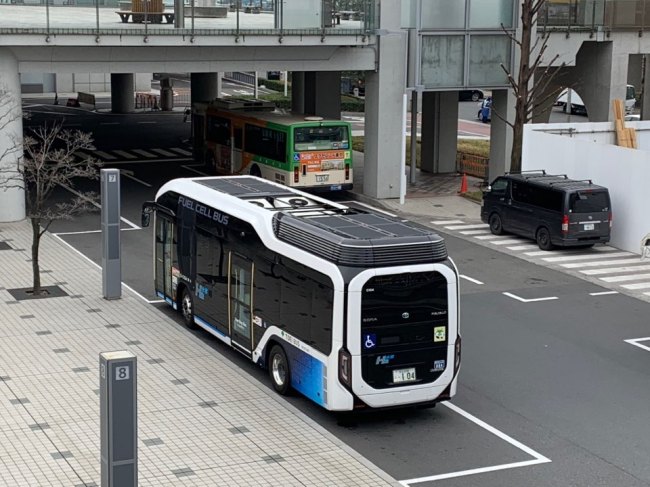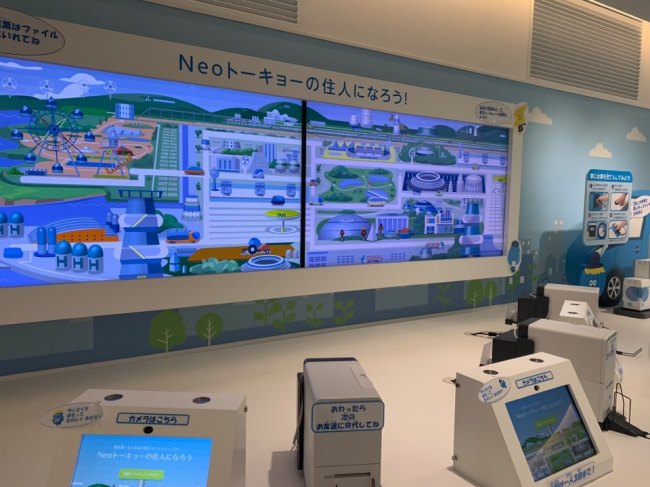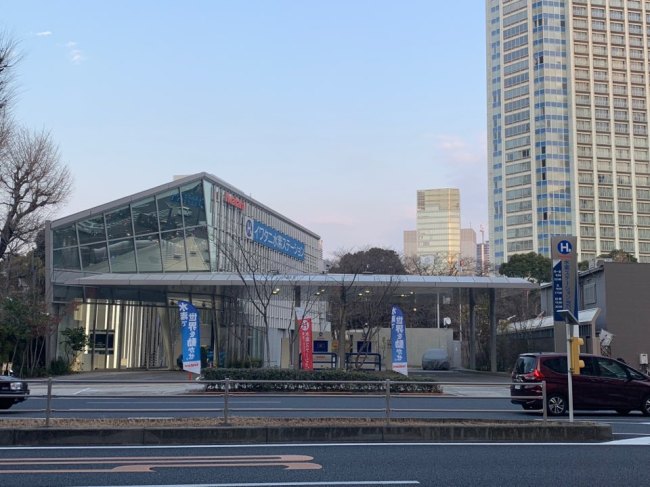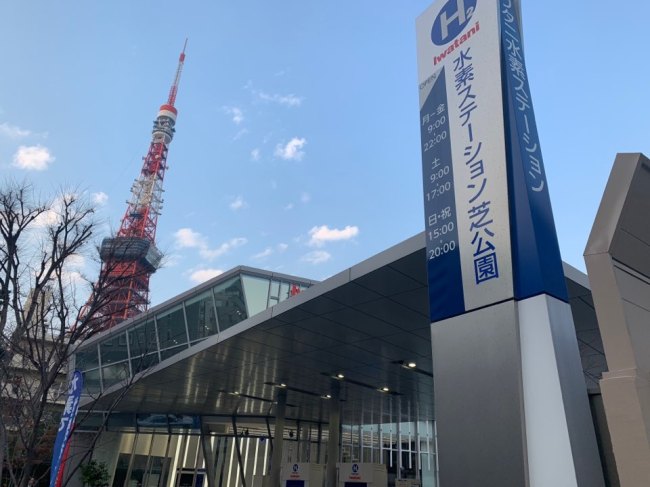[Hydrogen Korea] Japan paves way for hydrogen future, but public unconvinced
Japanese carmakers urged to lower FCEV prices; cost of fuel, transportation cited as hurdles
By Cho Chung-unPublished : March 20, 2019 - 17:30
The Korea Herald is publishing a series of articles on South Korea’s latest measures to support the hydrogen economy, the market drive for hydrogen-powered vehicles and the hurdles that stand in the way. This is the seventh installment. -- Ed.
TOKYO -- Close to Shiba Park, just under the Tokyo Tower, one of the Japanese capital’s most famous landmarks, is a modern building plastered with a huge H2 symbol.
It is a hydrogen refilling station operated by Iwatani Corp., a local gas company, in Tokyo’s Minato Ward, serving as a local hub for promoting fuel cell electric vehicles powered by hydrogen. It is one of 113 hydrogen refueling stations across the country, subsidized by the Japanese government.
TOKYO -- Close to Shiba Park, just under the Tokyo Tower, one of the Japanese capital’s most famous landmarks, is a modern building plastered with a huge H2 symbol.
It is a hydrogen refilling station operated by Iwatani Corp., a local gas company, in Tokyo’s Minato Ward, serving as a local hub for promoting fuel cell electric vehicles powered by hydrogen. It is one of 113 hydrogen refueling stations across the country, subsidized by the Japanese government.

Drawing a clear comparison with a gas station next door lined up with gasoline cars, however, the H2 station stood in complete silence for nearly two hours on a weekday afternoon, with no FCEVs coming in to refill.
In the wake of the Fukushima disaster, Japan has been exploring ways to realize a hydrogen-based economy, with massive public investments in infrastructure and promoting awareness of hydrogen with a strong political commitment.
But Japan’s hydrogen project still faces a “chicken and egg” problem -- even with the massive infrastructure investments already made by the government, the number of FCEVs is still low -- leaving energy companies and automakers questioning whether it is worth entering the sector.
And without a dramatic increase in the number of FCEVs, not only the price of the vehicle itself but also the cost of hydrogen production and distribution would remain high, according to Masana Ezawa, director at hydrogen and fuel cells strategy office under the Ministry of Economy, Trade and Industry, urging Japanese carmakers to make the vehicles affordable and compatible to hybrid vehicles by 2025.
Toyota’s Mirai, meaning “future” in Japanese, costs about 72 million won ($63,680), and customers get 20 million won of government subsidies.
“We don’t have enough vehicles, we should make FCEVs a viable choice for consumers,” he said at a keynote session held on sidelines of FC Expo in Tokyo last month.
“Automakers should lower the cost that it can be marketed at. … We hope to see an increase in FCEV models.”
This year, Japan’s hydrogen road map is at a critical stage as the country hosts the 2020 Summer Olympics by when the government plans to showcase its vision of a hydrogen society.
The government plans to operate 100 fuel cell buses and 35 hydrogen fueling stations in Tokyo by the time the nation hosts the global sports event. By 2025, it aims to have 100,000 fuel cell cars on the roads of the capital and 900 refueling stations five years after that. As of 2018, it had 2,839 FCEVs registered nationwide.
To open the new era of a hydrogen society, lowering the price of energy is crucial, the director said.
Currently, 1 kilogram of hydrogen costs 1,100 yen ($9.85) in Japan. But the government wants to bring the price down to 20 yen by 2050, Ezawa said while presenting the country’s hydrogen road map.
To promote public awareness on the use of hydrogen, the Tokyo Metropolitan Government and the Tokyo Environment Public Service Corporation opened the Hydrogen Museum in the southwestern part of the capital city.

A robot called Pepper welcomes visitors to the two-story museum which shows how Japan is painting a rosy picture of the hydrogen economy.
Apparently for children, the museum added fun factors and created animated characters to help them better understand how hydrogen would become one of the main energy sources for Japan.
“We get around 20 visitors daily, mostly children aged between 8 and 10,” said a curator at the museum.
“There are also some adults visiting the museum, but Japanese people in general have little knowledge of hydrogen energy,” she said via a translating app.
Japan has been taking the lead in hydrogen development, establishing an overseas supply chain connecting Japan with Brunei and Australia. In cooperation with Australia, Japan is also seeking ways to make hydrogen from brown coal and transport it via liquefied hydrogen carriers. Intensive development is also underway to turn power into hydrogen gas through electrolysis technology, a way of reserving energy, like converting milk to cheese for longer storage.


To make this supply chain work and develop technologies to make this concept happen, the government has sanctioned 400 billion yen of public funds this year alone.
Despite its acknowledgement that its hydrogen economy vision is not widely accepted by the public and the market, the Japanese government seems steadfast in its grand mission. But Ezawa said without cooperation from the industry, the road to a hydrogen society will never be realized.
“The ultimate goal is to have the investments we made bear fruit and continue working together with the government, academia and industry,” Ezawa said.
“Cost reduction is important (as well as) collaboration between the government and industry.”
By Cho Chung-un, Korea Herald correspondent (christory@heraldcorp.com)







![[KH Explains] Hyundai's full hybrid edge to pay off amid slow transition to pure EVs](http://res.heraldm.com/phpwas/restmb_idxmake.php?idx=644&simg=/content/image/2024/04/18/20240418050645_0.jpg&u=20240419100350)







![[From the Scene] Monks, Buddhists hail return of remains of Buddhas](http://res.heraldm.com/phpwas/restmb_idxmake.php?idx=652&simg=/content/image/2024/04/19/20240419050617_0.jpg&u=20240419175937)

![[KH Explains] Hyundai's full hybrid edge to pay off amid slow transition to pure EVs](http://res.heraldm.com/phpwas/restmb_idxmake.php?idx=652&simg=/content/image/2024/04/18/20240418050645_0.jpg&u=20240419100350)

![[Today’s K-pop] Illit drops debut single remix](http://res.heraldm.com/phpwas/restmb_idxmake.php?idx=642&simg=/content/image/2024/04/19/20240419050612_0.jpg&u=)